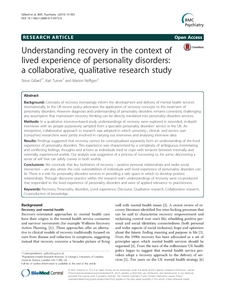Gillard, S; Turner, K; Neffgen, M
(2015)
Understanding recovery in the context of lived experience of personality disorders: a collaborative, qualitative research study.
BMC Psychiatry, 15 (1).
p. 183.
https://doi.org/10.1186/s12888-015-0572-0
SGUL Authors: Gillard, Steven George
![[img]](https://openaccess.sgul.ac.uk/107456/1.hassmallThumbnailVersion/Understanding%20recovery%20in%20the%20context%20of%20lived%20experience%20of%20personality%20disorders%3A%20a%20collaborative%2C%20qualitative%20research%20study..pdf)  Preview |
|
["document_typename_cannot open `/data/SGUL/sgul/eprints3/archives/sgul/documents/disk0/00/10/74/56/01/Understanding' (No such file or directory)
cannot open `recovery' (No such file or directory)
cannot open `in' (No such file or directory)
cannot open `the' (No such file o" not defined]
Published Version
Available under License Creative Commons Attribution.
Download (533kB)
| Preview
|
Abstract
BACKGROUND: Concepts of recovery increasingly inform the development and delivery of mental health services internationally. In the UK recent policy advocates the application of recovery concepts to the treatment of personality disorders. However diagnosis and understanding of personality disorders remains contested, challenging any assumption that mainstream recovery thinking can be directly translated into personality disorders services. METHODS: In a qualitative interview-based study understandings of recovery were explored in extended, in-depth interviews with six people purposively sampled from a specialist personality disorders' service in the UK. An interpretive, collaborative approach to research was adopted in which university-, clinical- and service user (consumer) researchers were jointly involved in carrying out interviews and analysing interview data. RESULTS: Findings suggested that recovery cannot be conceptualised separately from an understanding of the lived experience of personality disorders. This experience was characterised by a complexity of ambiguous, interrelating and conflicting feelings, thoughts and actions as individuals tried to cope with tensions between internally and externally experienced worlds. Our analysis was suggestive of a process of recovering or, for some, discovering a sense of self that can safely coexist in both worlds. CONCLUSIONS: We conclude that key facilitators of recovery - positive personal relationships and wider social interaction - are also where the core vulnerabilities of individuals with lived experience of personaility disorders can lie. There is a role for personality disorders services in providing a safe space in which to develop positive relationships. Through discursive practice within the research team understandings of recovery were co-produced that responded to the lived experience of personality disorders and were of applied relevance to practitioners.
Statistics
Item downloaded times since 17 Mar 2016.
Actions (login required)
 |
Edit Item |



